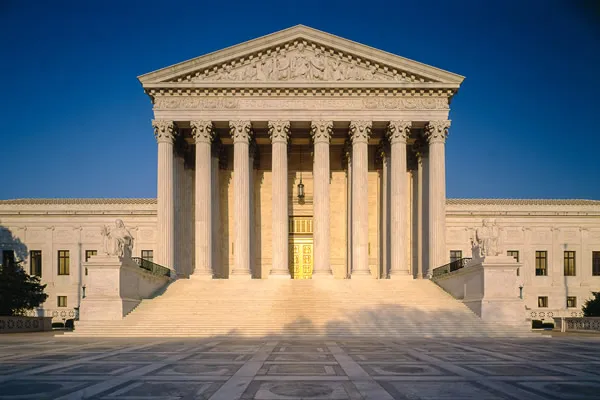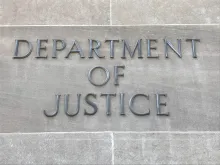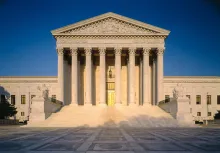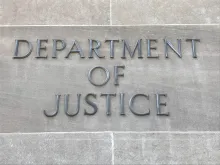SUPREME COURT PREVIEW: Trump Firing of FTC Commissioner Among Issues Before Court
October 2, 2025
The new U.S. Supreme Court term begins on October 6, and a decision expected to be handed down this term could shape the fate of the Federal Trade Commission, and hence antitrust and consumer protection enforcement and policy, for years to come. The underlying case involves a challenge to President Trump’s firing of Rebecca Kelly Slaughter as a commissioner without cause in violation of the FTC Act. While this case will be closely watched, there are other petitions that have been raised to the Court that are of interest to the antitrust and trade regulation community. A number of the petitions have support from industry and interest groups.
President’s authority to fire FTC commissioner without cause. In September, a majority of the Court, over the dissents of Justices Elena Kagan, Sonia Sotomayor, and Ketanji Brown Jackson, granted a stay of a federal district court injunction that prevented the enforcement of Trump’s firing of Slaughter. In March, Slaughter sued Trump over her firing, seeking among other things a declaration that the termination was unlawful. Slaughter argued that Section 1 of the FTC Act provides that removal of a commissioner by the President can only be based on "inefficiency, neglect of duty, or malfeasance in office” and that the 90-year-old decision in Humphrey’s Executor v. U.S., 295 U. S. 602 (1935) “unanimously affirmed the constitutionality of the statutory tenure protections.” The district court granted summary judgment in favor of Slaughter. A split panel of the D.C. Circuit denied the Trump Administration’s motion for a stay pending appeal.
The Trump Administration sought temporary relief from the Supreme Court, arguing that the lower courts erred in their “unduly expansive reading of Humphrey’s Executor that ignores [the Supreme] Court’s more recent precedents. The Administration called on the Court to review two questions: (1) Whether 15 U.S.C. 41 violates the separation of powers by prohibiting the President from removing a member of the Federal Trade Commission except for “inefficiency, neglect of duty, or malfeasance in office”; and (2) Whether the district court’s order restoring respondent to office exceeded the court’s remedial authority.
On September 22, the stay of the district court judgment was granted. The Court treated the application for stay as a petition for a writ of certiorari before judgment and granted the petition for review. In other words, Slaughter is off the Commission pending a final decision of the Supreme Court. The dissenting Justices took the position that “Humphrey’s controls, and prevents the majority from giving the President the unlimited removal power Congress denied him,” noting that “Humphrey's rejected a claim of presidential prerogative identical to the one made in this case.”
The Court tweaked the “questions presented” in the stay application, as it sometimes does with petitions for review. The parties were directed to brief and argue the following questions: (1) Whether the statutory removal protections for FTC members violate the separation of powers and, if so, whether Humphrey’s should be overruled; and (2) Whether a federal court may prevent a person’s removal from public office, either through relief at equity or at law.
The respondents’ brief on the merits and the reply brief are due in November. In light of the actions by the Supreme Court to date, it appears that the Court will side with Trump on his authority to fire the FTC commissioner. The ultimate fate of Humphrey’s is less clear. The Court could narrow the holding. It could rule, as the President argues, that the reading of that precedent by the lower courts was too expansive. Further, the Court could distinguish the decision in Humphrey’s in light of the “major additional powers” that the agency has accumulated since 1935 that amount to “vast executive authority.”
The Commission has heralded its bipartisan cooperation over the years. It has made efforts, sometimes unsuccessful, to reach consensus among the differing views of its commissioners. A Commission limited to members of a single party could indeed impact future antitrust and consumer protection enforcement and policy. It could lead to significant swings in approach between Republican and Democratic administrations. Although some might argue that has already been happening, dramatic change in approach every four or eight years would not bode well for business and industry looking for continuity.
The case is Trump v. Slaughter, Dkt. No. 25-332.
Other petitions. The Supreme Court will have the opportunity to consider other issues of interest to the antitrust and trade regulation community this term.
Association rules. In a suit alleging an illegal agreement between Zillow Group, Inc. and the National Association of Realtors (NAR) related to NAR’s non-mandatory no-commingling rule, the Court was asked to decide whether a business association’s optional rules can constitute a conspiracy subject to Section 1 of the Sherman Act. Real Estate Exchange, Inc., which competed with NAR members to represent home buyers and sellers, argued that there is a split among the circuits on whether a business association that publishes a rule for its members can immunize the rule, and members’ adherence to it, from being considered an antitrust conspiracy by making the rule optional. The petitioner seeks reversal of a Ninth Circuit decision that the complaining real estate company could not prove that Zillow and NAR committed to a common, anticompetitive scheme. The fate of the petition could be determined as early as this month.
The petition is Real Estate Exchange, Inc. v. Zillow Group, Inc., Dkt. No. 25-326.
- This is not the first time an NAR rule has been the subject of a petition for Supreme Court review. For instance, in January 2025, the Court denied a petition for certiorari filed by NAR that sought to overturn a decision by the U.S. Court of Appeals in Washington, D.C., holding that the Department of Justice was able to withdraw from an antitrust settlement agreement with the association (National Assn. of Realtors v. U.S., Dkt. No. 24-417). In addition, in 2022, the association unsuccessfully sought review of a decision of the U.S. Court of Appeals in San Francisco concerning market definition and standing in the context of an NAR policy that required members of an NAR-affiliated multiple listing service (MLS), who chose to list properties on a PLS.com real estate database, also to list those properties on an MLS (National Assn. of Realtors v PLS.com, LLC, Dkt. No. 22-289).
Arbitration clauses. In another pending petition, Live Nation Entertainment, Inc. asked the Court to overturn a Ninth Circuit ruling, affirming that the delegation clause of a Live Nation arbitration agreement was unconscionable. The case involved antitrust claims brought by consumers who purchased tickets to live entertainment promoted by Live Nation and sold through Ticketmaster’s website, where the website included an agreement to comply with Ticketmaster’s Terms of Use. Ticketmaster’s terms provided that any claim arising out of the ticket purchase, as well as any prior ticket purchase, was to be decided by an arbitrator employed by New Era ADR. The Ninth Circuit held that the delegation clause of the arbitration agreement, and the arbitration agreement as a whole, were unconscionable and unenforceable under California law.
Live Nation argued to the Court that the Federal Arbitration Act (FAA) applies to all arbitration agreements, based on the FAA’s text. Also, it argued that California’s severability rules violate the FAA and the Supreme Court’s arbitration precedent. Friend-of-the-court briefs have been filed requesting that the Court grant certiorari.
The petition is Live Nation Entertainment, Inc. v. Heckman, Dkt. No. 24-1145.
Statute of limitations. Defense contractors seek review of a decision of the U.S. Court of Appeals in Richmond, Virginia, contending that the ruling permitted naval engineers to revive "decades-old" antitrust claims by alleging a secret, unwritten no-poach agreement. A district court held that a “non-ink-to-paper” agreement could not constitute an affirmative act of fraudulent concealment, so it did not toll the limitations period. Reversing, the Fourth Circuit panel said that “neither logic nor our precedent supports distinguishing between defendants who destroy evidence of their conspiracy and defendants who carefully avoid creating evidence in the first place.” The petition argues that the decision conflicts with rulings from the Fifth, Sixth, and Ninth Circuits, which require affirmative acts of concealment beyond mere secrecy to toll the Sherman Act’s four-year statute of limitations. An extension for the response was granted until November 14.
The petition is General Dynamics Corp. v. Scharpf, Dkt. No. 25-293.
Noerr-Pennington immunity. A petition filed by direct purchasers of Merck vaccines whose antitrust claims against the drug company were rejected by the U.S. Court of Appeals in Philadelphia asks whether intentional deception of the government in an adjudicative proceeding is completely immunized from antitrust liability so long as the deception is successful. Arguing a split among the circuits, the purchasers contend that the Third Circuit “reject[ed] a standalone exception to Noerr-Pennington immunity for petitions containing fraudulent misrepresentations,” while “ten other circuits ... have refused to provide blanket immunity for intentional misrepresentations, and in so doing have expressly acknowledged the split with the Third Circuit.”
The American Antitrust Institute and the Open Markets Institute have urged the Court to grant the petition. They ask that the Court recognize a misrepresentation exception to Noerr-Pennington. A decision on the whether the Court will take the case could come this month.
The petition is Chatom Primary Care, P.C. v. Merck & Co., Inc., Dkt. No. 25-45.
Baseball exemption. The Supreme Court has been asked to wade into the “business of baseball” antitrust exemption. Minor league baseball players petitioned for review of a First Circuit panel decision in their case against the Commissioner of Baseball and the constituent Major League Baseball Clubs. The players allege a conspiracy to uniformly pay salaries, at below market levels, to minor league baseball players in violation of the Sherman Act. They argue that there should not be any judicially created business of baseball exemption and ask that the judicially created exemption in Federal Baseball Club of Baltimore v. National League of Professional Base Ball Clubs (259 U.S. 200 (1922)) and its progeny be eliminated by the Supreme Court that created it.
The petition is Concepcion v. Office of the Commissioner of Baseball, Dkt. No. 25-199.
Rule of reason vs. per se analysis for tying claims. The Court could take up whether rule of reason analysis, rather than per se treatment, properly governs tying claims under Section 1 of the Sherman Act in the context of technologically integrated software products. SAP SE and related companies petitioned the Court to review a decision of the Ninth Circuit, declining to apply the rule of reason in an action brought by Teradata Corporation. Teradata, an enterprise data and warehousing analytics company, alleging that SAP, an enterprise resource planning software vendor, illegally tied sales of its business-management software to sales of its back-end database engine. SAP also has support for its request for certiorari from amici.
The petition is SAP SE v. Teradata Corp., Dkt. No. 24-1324.
Antitrust remedies. Another potential issue that the Court could consider involves the remedy in an antitrust action brought by Epic Games against Google. Google has requested a stay of the permanent injunction entered by the district court in the high-profile case. Google has asked the Supreme Court for a partial stay pending its petition for review of a Ninth Circuit panel decision affirming the injunction. In the case, Epic Games alleged that Google foreclosed competition in a market for Android App distribution and in a discrete market for in-app billing services on Android devices. A jury found that Google unlawfully monopolized Android App distribution and in-app billing services markets on Android devices, and that verdict was affirmed. The federal district court in San Francisco entered the injunction against Google that is in question. Google contends that the remedy is not good for either users or developers.
Friend-of-the-court briefs have been filed, urging a stay. One was submitted by former national security officials and scholars who warn of possible national security disruptions that could result from the permanent injunction. The other brief was filed by the App Association, an advocacy organization representing developers of software applications (apps). The App Association contended that the remedy in the case could harm its members due to, among other things, possible security risks for developers. The group also argued that a stay will “maintain the existing vigorous competition between curated online marketplaces that benefits app developers."
The application for stay is Google LLC v. Epic Games, Inc., No. 25A354.
While a number of antitrust issues have been raised to the Supreme Court already, other relevant petitions will likely follow over the course of the Court's October 2025 term.
You may also like







